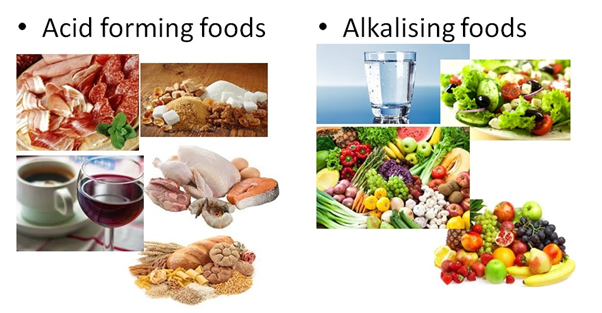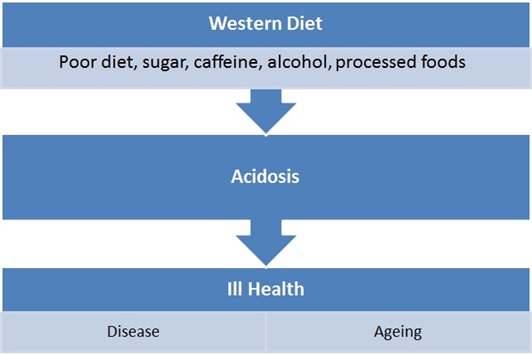How our lives have changed
100,000 generations: hunters and gatherers
500 generations: introduction of agriculture
10 generations: industrial times
2 generations: eating highly processed foods
While our lifestyles have changed, our genes do not differ greatly from those of our ancestors. Not only has our diet changed, but also the levels of environmental toxins, pollutants and chemicals are unprecedented. Add to this the stress modern living exerts on us, and it is not difficult to understand why our bodies are struggling.

All of modern life’s burdens affect the acid-base balance or pH of our body.
What affects our body’s pH?
The every-day functions such as eating and moving produce metabolic acids. These are generally cleared by our bodies via the kidneys and lungs. However, when things aren’t as balanced as they should be, metabolic acidosis occurs.
Things that increase acid levels include:
- Consuming high-acid forming foods – these include animal products, sugar, grains, caffeine, alcohol, soft drinks/sports drinks and highly processed foods (take-aways, packaged foods)
- Dieting and fasting – a high protein Paleo or Keto diet
- High intensity exercise (just 5 minutes of a spin cycle at 30 Watts require 20 minutes to restore tissue pH during which time bone tissue is already lost)
- Inflammation – acute or chronic
- Medications – including antacids, laxatives, diuretics, antibiotics, The Pill
- Insufficient water intake

Why does metabolic acidity harm us?
On the pH barometer you will see where optimal functioning organs lie. Our blood, for example, has a very narrow range of pH 7.34-7.45. If it deviates outside this range, we die. No discussion. No options. Therefore, one of the most important things our body tries to maintain is blood pH levels. In order to achieve this, the body will resort to any means, often robbing Peter (bones) to pay Paul (our blood).
![]()
What this means is that if your body is acidic, it will use minerals to balance the pH. Our largest stores of minerals are our bones and muscle tissue. So if our diets are lacking in minerals – especially magnesium – it will draw these out of storage. This should help you understand that osteoporosis is not due to a calcium deficiency, but rather over-acidity of the body in conjunction with a loss of kidney function, loss of magnesium stores and poor diets. This is further supported by the scientific research which has shown that calcium and Vitamin D supplementation have not corrected osteoporosis (Journal of the American Society of Nephrology, 2006). Only alkalising the body helps restore bone density.
Magnesium is not only implicated in acidosis, but has been associated with the development of:
- Hypertension
- Coronary artery calcification (atherosclerosis)
- Insulin resistance and type 2 diabetes mellitus
- Metabolic syndrome
- Sudden cardiac death (heart attack) and arrhythmias
- Headaches/migraines
In fact, the Journal of Nutrition Today in 2016 stated that an estimated “one third of the general population may be magnesium deficient” and that this is often overlooked in general medical practices.
Imbalances in pH also affect our body’s cortisol production. So an acidic body will result in higher cortisol levels which, in turn, promote insulin resistance and obesity. On the flipside, Elsevier reports than an alkaline diet decreases the risk of insulin resistance.
In addition to bone losses due to elevated metabolic acidosis, our body also breaks down muscle tissue in an attempt to regulate its pH.
Pain is also significantly affected by acidity – the lower the pH in tissue, the higher the pain stimulus. Acidosis also degrades our connective tissue through loss of elasticity and increased rigidity, impairing cartilage, tendons and ligaments (as well as our skin – so acidity accelerates the visible signs of ageing). Various studies have shown that people experiencing chronic back pain, arthritic pain, tendonitis and migraine reported significant reduction in pain intensity following alkalising supplementation. (Vormann et al)
So how do we alkalise?
You can alkalise your body by eating a healthy diet which should be made up mostly of vegetables. If you choose to eat animal protein – meats, chicken, fish – it is fine but remember to balance out the acid-forming nature of these foods with lots of vegetables. How many vegetables you ask? One kilogram per day! Shocked? There are other options as well, including supplements.
Taking the proper form of minerals contributes to the elimination of acid and maintenance of the body’s pH. With the plethora of supplements available in stores and on line, it is easy to fall prey to clever marketing. However, taking the wrong form or inferior grade supplements will only exacerbate the problem. Therefore, it is essential to seek the advice and guidance of a qualified natural health practitioner.
Your practitioner is able to assess your level of acidity and provide guidance on how you can manage this yourself at home.
At True Medicine we are able to assess your needs and provide quality, high grade TGA-approved products that work. Call today to arrange an appointment on 07 5530 1863.
Don’t wait. Act now.

